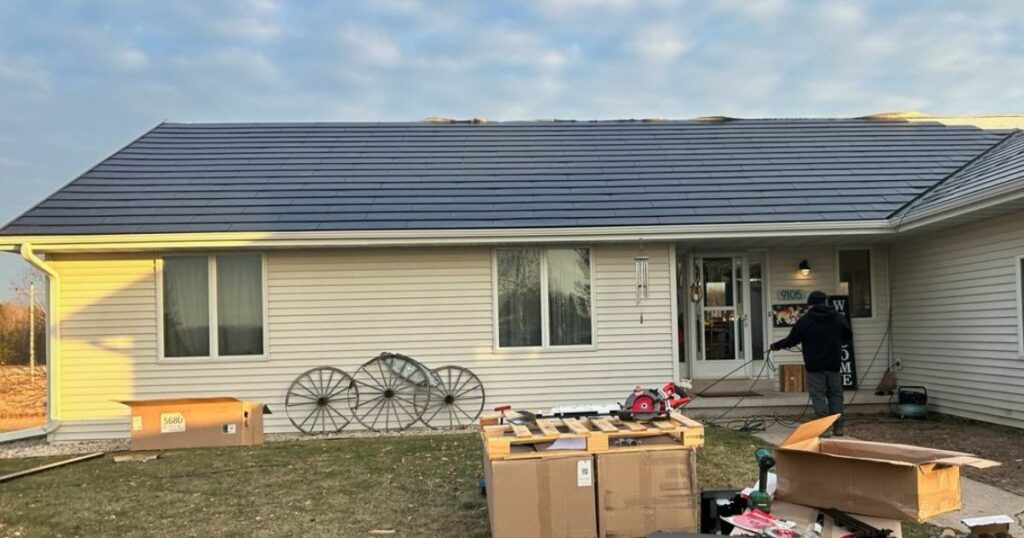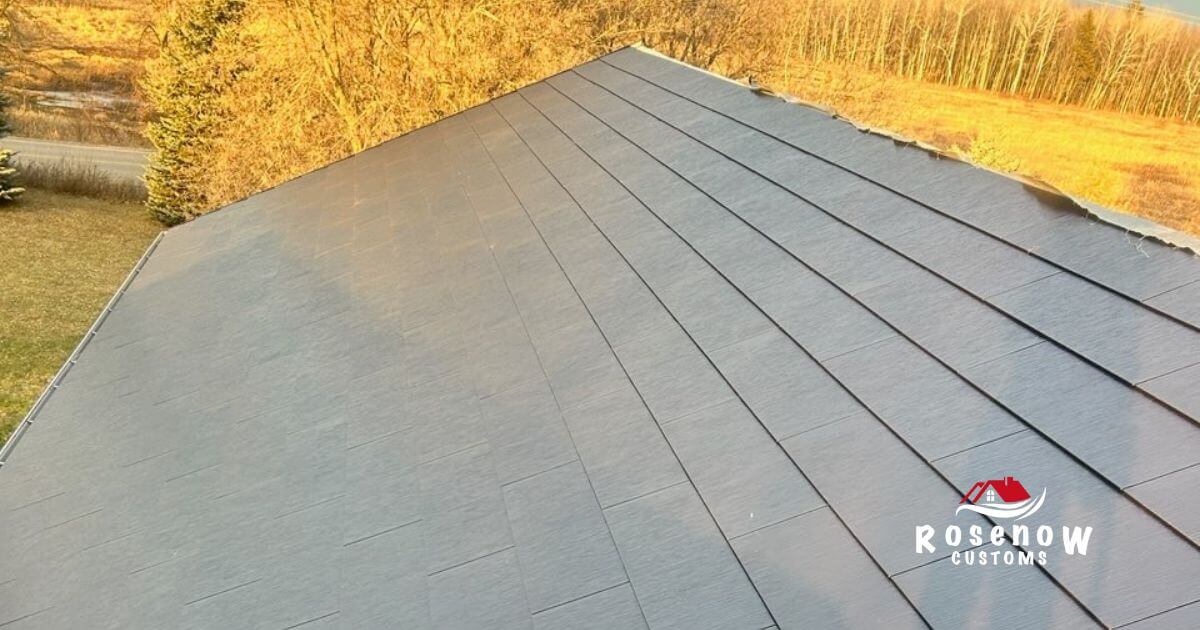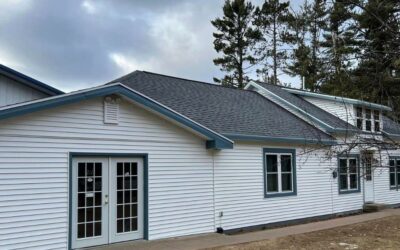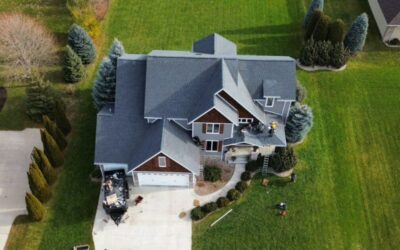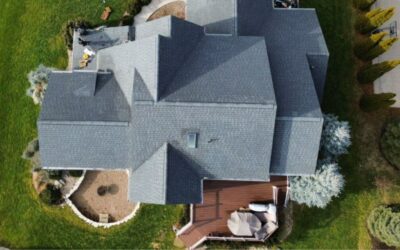Tesla shook up the solar industry when it unveiled its solar roof tiles back in 2016. While sleek and visually appealing, many homeowners wonder whether these futuristic-looking solar tiles are the right choice for their home. This comprehensive guide examines everything you need to know about Tesla solar roofing as a Wisconsin homeowner. With Rosenow Customs, Wisconsin homeowners can explore the cutting-edge technology of Tesla solar roofs with the assurance of professional and knowledgeable support.
What Exactly is the Tesla Solar Roof?
The Tesla solar roof is an integrated solar panel system designed to look just like ordinary roofing tiles. The solar tiles absorb sunlight and convert it into electricity to power your home. They are made of glass composite and have integrated solar cells.
From street level, the Tesla solar roof is nearly indistinguishable from a regular asphalt shingle roof. But Tesla’s solar tiles produce clean energy from the sun. The energy harvested from the tiles tie into your home’s electrical system to power appliances, electronics, lighting, HVAC systems and more. Any excess electricity can get backfed into the grid.
Can Tesla’s Solar Roof Fully Power a Wisconsin Home?
Tesla’s solar roof tiles are slightly less efficient, rated at nearly 22% efficiency compared to traditional solar panels closer to 25%. The solar tiles on a Tesla solar roof generate around 15 watts per square foot. Whether or not a Tesla roof can fully power a home in Wisconsin depends on a number of factors:
- Roof Square Footage – The larger the roof, the more solar tiles can be installed to harvest more sunshine. Altmeyer Electric and Rosenow Customs will assess your specific roof size and layout during an in-person site evaluation or using satellite imagery.
- Home Energy Use – The amount of electricity you presently use on a monthly basis determines how much solar capacity you need. High-efficiency appliances and prudent energy use makes it easier to meet more demand with solar. The average home uses approximately 10,632 KWh of electricity each year. A simple math formula to determine the amount of solar is as follows: Yearly KWh usage / 1.4 / size of solar panels (72W)
- Sun Exposure – Solar requires direct, unshaded sunlight to operate at peak capacity. If too much of your roof is shaded by trees or other buildings, your energy production will lag. Altmeyer Electric and Rosenow Customs’ site assessment accounts for expected sun exposure.
- Battery Storage – Tesla’s Powerwall home batteries let you store solar energy for use at night or during a power outage. Adding battery storage provides energy resilience and can help fully power a home with the right solar roof and hardware specs.
Every home’s situation is different. Tesla tailors each solar roof design and hardware package to match the projected energy loads. Most Wisconsin homes can secure at least 50% or more of their electrical needs from a properly sized Tesla solar roof system. Our goal is always to obtain a 100% energy offset.
What Do Tesla Solar Roofs Cost in Wisconsin?
Tesla solar roofs are a premium product made with high-end materials and components. The costs ultimately come down to your specific roof size, home energy demands, and the complexity of the installation process.
That said, on average, most Tesla solar roofs in Wisconsin range anywhere from $45 to $50 per SQ FT. The average home has 3,000 SQ FT of roofing. 3,000 x $47 = $141,000. This does not include Powerwalls. Keep in mind, in Wisconsin, there is a 30% federal tax credit available until 2033 and an additional $500 of Focus on Energy money. This can help offset the gross system cost.
Like a regular roof replacement, several factors influence the final price tag:
- Roof Size & Layout – Larger and more complex roofs cost more. Altmeyer Electric and Rosenow Customs will assess the exact measurements, planes, angles, and obstructions during their site evaluation.
- Energy Loads – The number of solar tiles needed depends on how much power your home uses monthly. High energy demand raises costs.
- Roof Replacement – In most cases, your existing roof will need to be removed and replaced with Tesla’s solar roofing system, which adds about $11,500 in Wisconsin according to HomeAdvisor.
- Permit Fees – Building permits vary by Wisconsin municipality. Altmeyer Electric & Rosenow Customs include expected local permit fees into your personalized quote.
Tesla also factors current state solar incentives in Wisconsin along with the 30% federal solar tax credit. These incentives and credits reduce your out-of-pocket costs.
Ongoing maintenance costs are low. Tesla warranties its solar roof tiles for 25 years. The tempered glass and steel construction is durable and rated for 110 mph winds. You should expect at least 25 years of trouble-free solar energy generation.
Weighing the Pros and Cons of Tesla Solar Roofing
Tesla’s integrated solar shingles offer some meaningful benefits but also have some downsides to consider:
Pros
- Sleek, low profile aesthetic
- Replace your roof and add solar in one step
- 25-year weather and tile durability warranty
- Higher home resale value
- Lock-in lower energy rates for decades
- Storage options for power resilience
Cons
- Higher upfront cost than traditional solar panels
- Complex installation process
- Slightly lower solar efficiency than solar panels
- Only available in black and one style
- Long wait times – 6 months not uncommon
For homeowners thinking about both roof replacement and adding solar, Tesla’s integrated offering tackles both projects at once. And the sleek look avoids installing bulky solar panels that detract from your home’s aesthetics. It ultimately comes down to your budget and priorities.
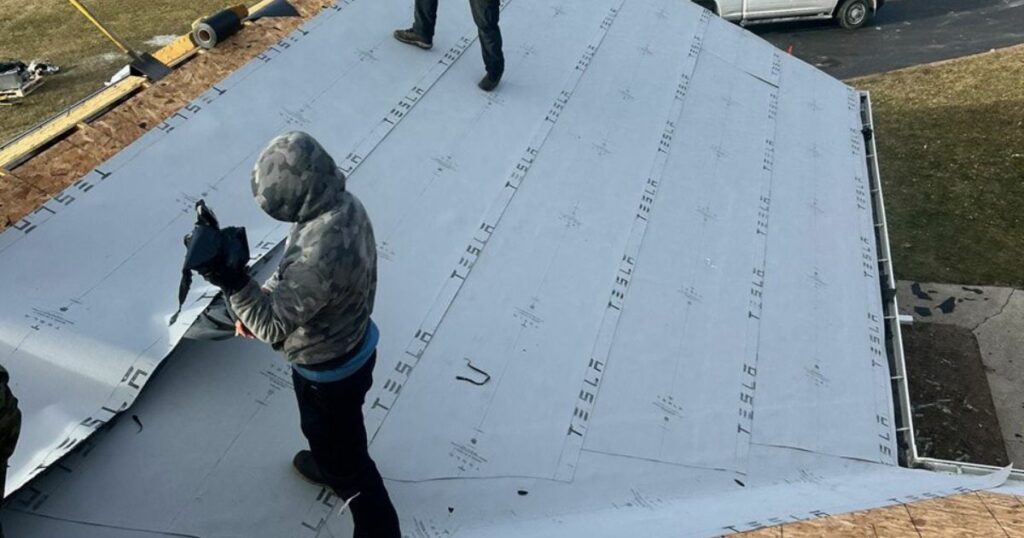
How Does Tesla Solar Roof Installation Work?
Installing a Tesla solar roof in Wisconsin follows a straightforward process:
1. Home Assessment – Altmeyer Electric & Rosenow Customs will evaluate your site, measure your entire roof for accurate specs, test for roof complexity, and discuss your unique home energy needs. This information gets used to design a custom solar roof solution for your home.
2. Place Your Order – You provide basic contact info to get the ordering process started. Firm pricing and details will be confirmed during the site survey.
3. Installation Scheduling – After signing off on your finalized solar roof design and quote, Altmeyer Electric & Rosenow Customs handle permitting and utility approvals. Once complete, you can schedule the roof installation date.
4. Solar Roof Installation – Crews will tear off and dispose of your old roof before installing the new Tesla solar roof system. The install process typically takes 5 to 7 days depending on roof size and complexity.
5. Completion & Activation – After passing final municipal inspections, your utility company will grant Altmeyer Electric & Rosenow Customs permission to operate (PTO) your solar roof. Then you can monitor solar production through the Tesla app and begin running your home on sunlight!
From start to finish expect about 3-6 months. Altmeyer Electric & Rosenow Customs manages all the logistics – your responsibility is approving the final quote and helping schedule the install.
Just How Efficient is Tesla’s Solar Roof?
An inherent tradeoff exists between aesthetic appeal and solar efficiency. Standard rack-mounted solar panels generally operate around 25% panel efficiency. That number dips down to about 22% for Tesla’s integrated solar tiles.
Independent testing shows Tesla solar roof tiles running around 15% solar conversion efficiency. The low profile glass tiles look great but sunlight doesn’t strike them directly like traditional angled panels. Less direct sun access means lower efficiency.
But for homeowners unwilling to mount big solar panels on their roofs for aesthetic reasons, Tesla makes solar power generation possible while maintaining attractive home curb appeal. It ultimately comes down to your priorities – max solar output or sleeker, integrated solar tiles.
How Long Do Tesla’s Solar Tiles Last in Wisconsin?
Durability is a major factor for any roofing system exposed to Wisconsin’s varied weather. Tesla designed its tempered glass solar tiles and coated steel backing to hold up well in our climate.
- The tiles are 3X stronger than conventional asphalt shingles
- Class A fire rating for fire safety
- Wind resistance up to 110 mph (Class F)
- Impact resistant with durable glass surface
- Class 4 hail rating
Tesla also provides excellent long-term coverage:
- 25-year weatherization warranty – Protects against tile defects and weather damage
- 25-year power warranty – Covers power output minimums to ensure solar performance
- 25-year tile warranty – Guards against manufacturing issues resulting in cracked or broken solar tiles
- 10-year inverter warranty
- 10-year Powerwall warranty
The company expects its solar roofs to last 40-50 years or longer. And by integrating the tiles directly into your roof rather than mounting them on top, you avoid potential roof leaks down the road. The durable tempered glass and steel tiles should make it to your next roof replacement cycle years from now.
When Does a Wisconsin Tesla Solar Roof Pay for Itself?
With high upfront costs, many prospective buyers reasonably ask how long it takes to recoup their investment. The payoff timeline ultimately comes down to system specs, energy prices, and Wisconsin weather.
Based on feedback from installed Tesla solar roof owners in southern Wisconsin, the average payback period falls between 23-25 years. Owners claim their pricey Tesla solar roof pays off in less than a decade with the 30% federal tax credit and energy bill savings.
As with any solar installation, Tesla’s Powerwall battery storage extends the payback period slightly but provides greater energy independence and backup capability during grid outages. Even with the extra battery investment, most owners earn back their costs within 23-25 years.
If you run cost projections on Tesla’s website, be sure to input current We Energies electrical rates. As a cost comparison, We Energies charges around 14 cents per kW hour in early 2023. Tesla assumes 2% annual utility price hikes going forward. If you input accurate baseline rates, the solar payoff timeline calculation improves.
Can Tesla’s Solar Roof Charge an Electric Vehicle?
A common question among eco-friendly homeowners is using their solar roof to charge electric vehicles (EVs), including Tesla’s own models. The answer is yes – Tesla’s solar roof seamlessly pairs with Tesla EVs.
During the day, the extra solar energy production charges your Powerwall battery. That stored energy can then charge a plugged-in EV overnight. Some Wisconsin homeowners install larger solar roof systems specifically to power their Tesla EV. It takes ample solar harvesting and battery capacity but lets you bypass gasoline forever!
What Roof Color Options Exist for Tesla’s Solar Tiles?
Unlike traditional solar panels added on top of shingles, Tesla’s integrated solar tiles are your visible roofing. So aesthetics and color options matter more compared to racked panel setups.
Currently, Tesla offers its solar tiles in one color:
- Black – For a darker monochromatic look
Tesla may expand color offerings down the road as production scales up.
The limited color option worries some homeowners keen on lighter roofs or customized looks. For the eco-appeal plus sleek design, roof color takes a back seat. We expect additional tones as Tesla rolls out updates.
Will Tesla’s Solar Roof Work in Wisconsin Weather?
Wisconsin weather flickers wildly between seasons – often in the same week! First and foremost, Tesla built its glass composite solar tiles and steel backing pieces to withstand adverse weather year-round:
✔️ Hail/impact resistant
✔️ Handles heavy snow loads ✔️ 110+ mph wind resistance rating
✔️ Glass surface stands up to rainstorms
✔️ Zero roof penetrations that can leak
The Class A fire rating also provides peace of mind during dry seasons prone to grass fires across rural areas.
Beyond the robust product design, Tesla backs each solar roof in Wisconsin with tiered 25-year product, weatherization, and power warranties described above. Even if something happens over decades of harsh weather, you’re covered.
Should I Choose Tesla’s Solar Roof or Traditional Solar Panels?
Tesla offers both solar roof tiles and traditional rooftop solar panel systems. The advantages differ depending on which model you select:
| Tesla Solar Roof | Traditional Solar Panels | |
| Cost | $55,000+ (premium) | $16,000 – $23,000 (affordable) |
| Aesthetics | Sleek, integrated | Visible panels on roof |
| Installation Difficulty | Tear-off roof first | Simple racks added to roof |
| Sun Exposure Efficiency | 22% efficient tiles | 25% higher efficiency |
| Incentives | 30% federal tax credit; energy utility, state, local incentives + $500 Focus on Energy | 30% federal tax credit; energy utility, state, local incentives + $500 Focus on Energy |
| Electricity Production | Meets ~50% and potentially up to 100% of average home’s needs | 50% and potentially up to 100% in order to fully power some small homes |
| Warranties | 25-yr weather/operations, 25-years on glass tile durability | Depends on the brand; most have a 25 yr warranty |
| Resilience | Requires add-on battery for overnight/outage usage | Requires add-on battery for overnight/outage usage |
Tesla solar panels cost notably less than their sleek solar roof offering. Equipment, performance, and warranty differences get traded off for aesthetics in most cases. Solar panels produce 25% more solar energy with fewer parts that can fail.
Ultimately you cannot go wrong with either Tesla renewable energy system strengthening the resilience and sustainability of your home.
Why Choose Tesla Over Other Solar Roof Brands
Tesla made big waves with its 2016 solar roof reveal. And while slow initial production frustrated early adopters, the manufacturing line is running full speed today. Now with over 3,000 active installs, Tesla leads among integrated solar roof options.
Legacy brands like GAF, CertainTeed, Luma, and Eagle Roofing sell alternative solar shingles at competitive price points. Yet most lack the slick design and name brand appeal Tesla brings to the table. Tesla maintains a premium price but backs it up via:
- Breathtaking style mimicking premium roofing materials
- Integrated Powerwall home batteries
- Seamless app monitoring and Powerwall controls
- Multi-product ecosystem – solar, storage, EV charging
- Rockstar brand reputation attracting buyers
As the early mover focused exclusively on sleek solar roofs (not tacked-on panels), Tesla holds a key competitive advantage in a growing renewable energy market. Tesla energy products all seamlessly integrate for whole-home intelligence monitoring, control and optimization. That value prop keeps demand high despite higher costs.
For the eco-minded homeowner seeking energy independence with resilience, Tesla presents an aspirational product mix. Their solar roof plays a vital part powering homes sustainably for decades while looking fantastic.
Key Takeaways on Tesla’s Solar Roofing Solution
For homeowners in Wisconsin willing to embrace solar through a Tesla solar roof investment, keep these conclusions in mind:
- Costs more upfront than traditional solar panel additions
- Will likely meet over 50% of your home’s electrical needs
- Tempered glass solar tiles rated for 30+ years of use
- Federal and Wisconsin state credits reduce net expense
- Integrates batteries for overnight and outage usage
- Functions in all four seasons without issue
- Raises your property value and resale appeal
Hopefully, as costs drop over time, Tesla makes green energy and energy resilience a reality. Solar roofing eliminates the fossil fuel energy paradigm over a system lifetime. Through sleek design, Tesla removes traditional barriers to homeowners adopting clean energy.
Request a solar roof quote from Rosenow Customs, and Altmeyer Electric, serving all of Wisconsin if questions remain. Our solar advisors are standing by to discuss your specific situation in detail. Investing in a Tesla solar roof means taking a thoughtful, long-view towards home energy responsibility. Let’s connect to explore if Tesla’s solar roof solution fits your home!
